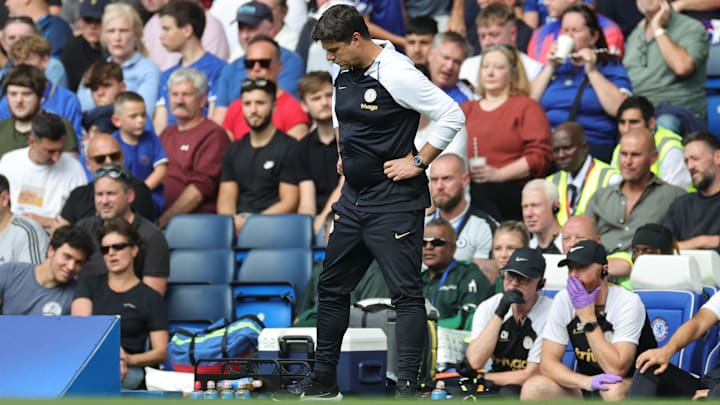Chelsea's challenges at Old Trafford persisted as Mauricio Pochettino's side faced a resounding defeat at the hands of Manchester United. Despite the challenging history, Chelsea fans remained optimistic heading into the fixture. The optimism stemmed from the team's recent hard-fought victory against Brighton, even with a player down. Another contributing factor was the recent downturn in form for Erik ten Hag's side, adding to the anticipation for the midweek clash.
On Wednesday, Chelsea delivered one of their weakest performances in recent memory, as Manchester United outplayed them in every aspect. The hosts showcased purpose, intent, and desire, while the Blues seemed to lack these essential elements. Even after the break, Pochettino failed to impact the outcome. The Argentine's ability to guide the team through this project is now under scrutiny after a disappointing result.
In Chelsea's preseason, significant promise shone through, highlighting a clearly defined structure and identity even in its early stages. While Christopher Nkunku's injury presented a challenge, asserting that all tactics revolved around just one player would be unreasonable. However, as the season commenced, the team's dynamics underwent a notable transformation, deviating substantially from the promising patterns observed during the preseason.
Despite a challenging start, Mauricio Pochettino maintained the backing of the fans. The unavailability of several key players posed a persistent challenge, contributing to the team's uneven performance. Chelsea's inconsistency was evident, with notable fluctuations between impressive displays and being outplayed on certain occasions, highlighting a struggle to establish a consistent and reliable form.
In the initial phase, Pochettino implemented a variety of tactical experiments within the team's lineup before achieving the intended results. Despite ample wingers available, the coach chose to start Ben Chillwell, typically a left-back, in the left-wing position. Levi Colwill, primarily a center-back, also assumed the left-back role. Other left-back options, including Marc Cucurella and Lewis Hall (before his loan), were notably available. Additionally, there was the experiment of deploying Axel Disasi, a center-back at right-back. Despite the apparent issues, this approach persisted, even in the Wednesday match. In contrast, when Pep Guardiola conducts experiments, it is often with the assurance that his team excels in other areas. Upon assuming control, Thomas Tuchel prioritized a return to basics over unnecessary tweaks.
Commencing a match with players in positions outside their natural roles predisposes them to failure. They have to perform tasks beyond their training, such as expecting a center-back to make runs down the wing for crosses during attacks or impede wingers when defending. Players like Raheem Sterling not tracking back exacerbate the issue. The same applies to deploying Marc Cucurella as a right-back instead of his preferred position. Such decisions make it easier for skilled opponents to capitalize on these vulnerabilities.
Interrogations about the efficacy of the training methods intensify as Carney Chukwuemeka's extended absence raises concerns. Malo Gusto's current unavailability adds to the scrutiny, and the injury to Noni Maduweke, despite limited playing time, prompts further questions. Additionally, the continued absence of Romeo Lavia and Nkunku raises eyebrows among the fanbase. Fans hope for a decrease in the injury list, only to find it unexpectedly expanding once more.
Pochettino's struggle to enhance the team sharply contrasts with Unai Emery's remarkable transformation of Aston Villa. Emery assumed control when Aston Villa was on the brink of relegation, orchestrating a revival that led to them clinching a European spot last season, all achieved without significant signings or time to settle. Currently thriving and holding a top-four position, Villa's ascent under Emery stands out. On the flip side, despite a favorable start to the season with fixtures, Chelsea currently finds themselves in mid-table under Pochettino's management.
Next up for Chelsea is an away fixture against Everton. Despite a 10-point deduction, Sean Dyche's side has already climbed out of the relegation zone following a significant victory over Newcastle United, a team that recently embarrassed Chelsea. Following the Everton match, the Blues will face Sheffield United at home. The Blades, currently at the bottom of the table after a managerial change, present an opportunity for Chelsea. Pochettino cannot afford any result other than a win in these two fixtures; otherwise, his position will face even more scrutiny, potentially leading to an exit.
